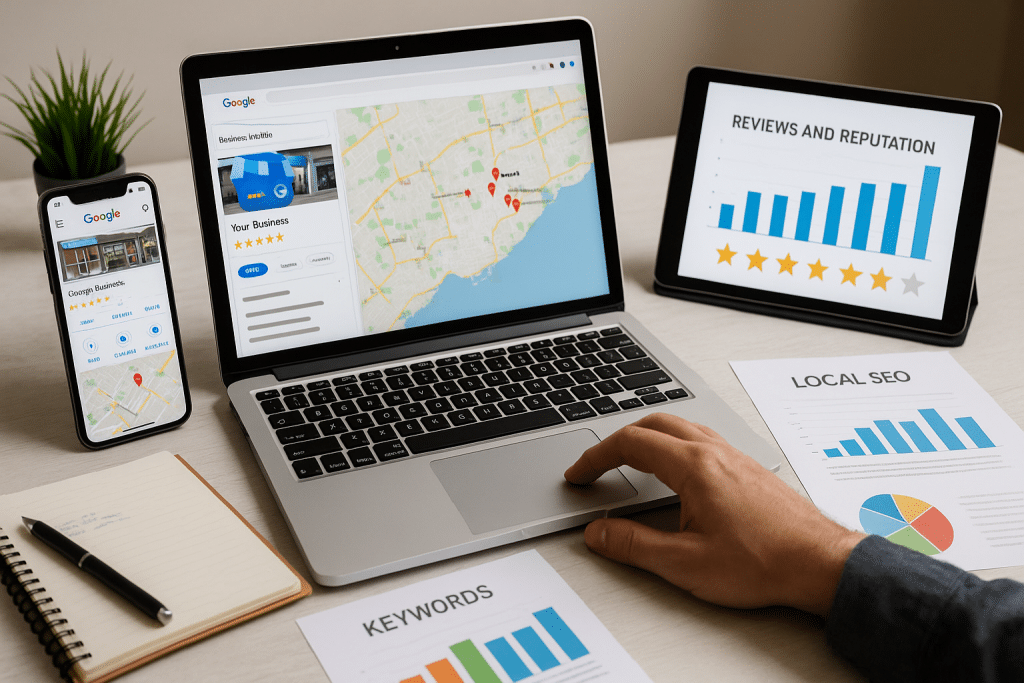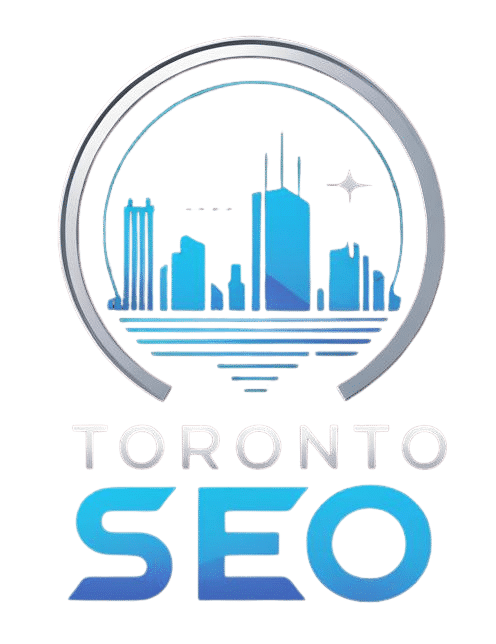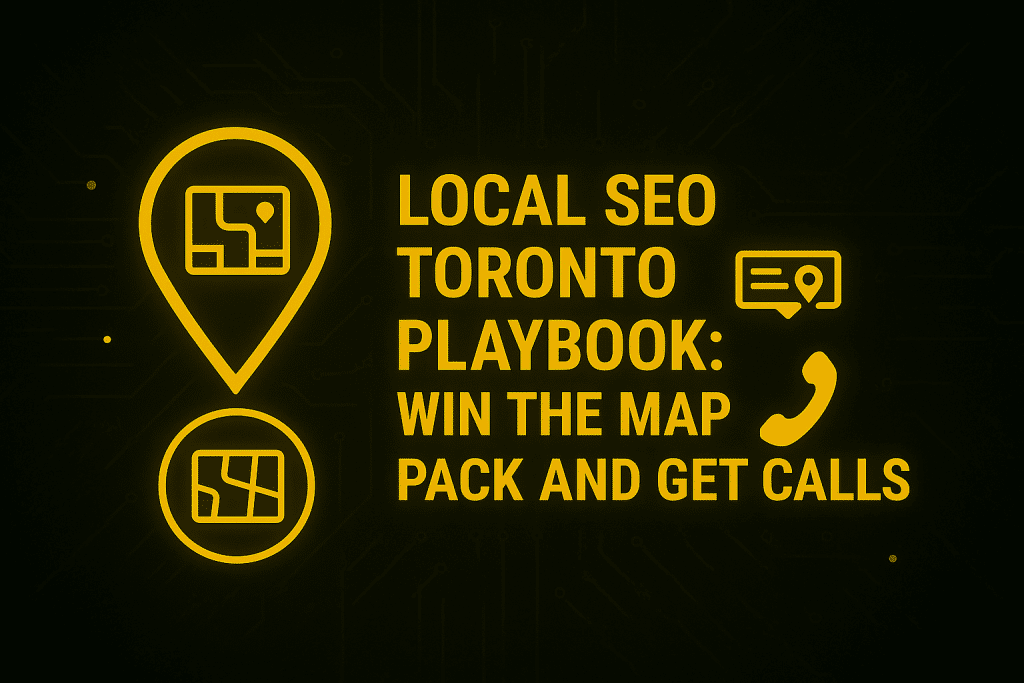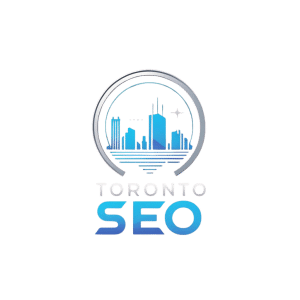Local SEO in Toronto has become the lifeline for businesses seeking steady customer calls, walk-ins, and conversions. In 2025, ranking in Google’s Local Map Pack isn’t just about visibility—it’s about owning prime digital real estate where high-intent buyers search first. With competition in Toronto heating up across industries, mastering local SEO strategies is non-negotiable for service-based businesses, restaurants, law firms, real estate agents, and more.
This playbook provides a step-by-step local SEO framework tailored to Toronto businesses to help you rank higher in local searches, dominate the Google Map Pack, and most importantly—turn those impressions into phone calls and paying customers.
Why the Google Map Pack is the New Battleground
Google’s Map Pack displays the top three local results when users search for services “near me.” For example, when someone searches “plumber Toronto near me” or “SEO agency Toronto,” the Map Pack often appears above organic results and paid ads.
Benefits of Ranking in the Map Pack:
Prime visibility: It sits at the very top of search results.
Call-to-action ready: Click-to-call, directions, and reviews are all built in.
Trust signals: Google Reviews and proximity give businesses instant credibility.
Mobile dominance: 60%+ of local searches in Toronto happen on mobile devices, where the Map Pack takes center stage.
According to Think with Google, 76% of people who search locally visit a business within 24 hours, and 28% make a purchase. Ranking here means real customers and real revenue.
Optimizing Your Google Business Profile for Toronto
Your Google Business Profile (GBP) is the cornerstone of Map Pack success. Without it, your chances of ranking locally are slim.
Steps to Optimize Your GBP:
Claim & Verify Your Listing – Ensure your Toronto location is claimed and verified.
Accurate NAP (Name, Address, Phone): Consistency across Google, your website, and directories is critical.
Category Selection: Choose the most relevant primary category. For example, “SEO Agency” vs. “Marketing Consultant.”
High-Quality Photos: Add interior, exterior, staff, and service photos. Businesses with photos get 42% more direction requests.
Google Posts: Publish updates weekly about promotions, case studies, or events.
Q&A Section: Answer frequently asked questions directly.
For deeper optimization strategies, you can review insights from Toronto SEO agencies using AI to outrank the competition.
The Power of Local Citations in Toronto SEO
Citations are mentions of your business across local directories, maps, and industry sites. For Toronto companies, being listed consistently across platforms like Yelp, YellowPages, and industry-specific sites boosts credibility in Google’s eyes.
Consistency is key: Ensure your NAP matches word-for-word.
Target Canadian directories: Focus on local sources like 411.ca and Canada411.
Industry-specific directories: For example, real estate agents on Realtor.ca or lawyers on Law Society of Ontario directories.
For a detailed analysis, see why citation building still matters for Toronto local rankings.
Local Keyword Targeting for Toronto Businesses
Keyword research for local SEO requires a Toronto-first mindset. Instead of generic terms, you need geo-modified, service-specific keywords that capture local buyer intent.
Examples:
“Toronto plumber near me”
“Best real estate agent downtown Toronto”
“SEO services Toronto pricing”
Use tools like Google Keyword Planner, but also analyze competitor rankings. Toronto is highly competitive, and your SEO content must be hyper-localized—mentioning neighborhoods like North York, Scarborough, Etobicoke, and Downtown.
Building Reviews and Reputation in Toronto
Reviews are one of the strongest local ranking signals. A business with 100+ five-star reviews in Toronto is nearly unbeatable in the Map Pack.

Best Practices:
Ask consistently: After each customer interaction, request a review.
Use SMS & email: Automate reminders with direct links to your Google profile.
Respond to all reviews: Both positive and negative. Google values engagement.
Leverage keywords: Encourage customers to mention your service + location (e.g., “best dentist in Toronto”).
This is also where personal branding intersects with SEO. For insights, read about why building a personal brand in search is the next big move for Toronto founders.
On-Page Optimization for Local Landing Pages
Your website must reinforce your local relevance. That means optimizing service pages and location pages specifically for Toronto.
Key On-Page Local Elements:
Title tags & meta descriptions: Include “Toronto” + service.
H1 headers: Geo-modified, like “Toronto Landscaping Services.”
Local schema markup: Use LocalBusiness schema to feed Google structured data.
Embedded Google Map: Display your location on contact pages.
Neighborhood mentions: Create content around specific Toronto boroughs.
Example: A landscaping company might create service pages for “Etobicoke landscaping services” or “Scarborough backyard design.”
Local Content Marketing for Toronto SEO
Creating localized content positions you as an authority in your niche. This means writing blog posts, guides, and case studies tied directly to Toronto events, neighborhoods, and problems.
Local Content Ideas:
“Top Neighborhoods in Toronto for First-Time Homebuyers”
“How Toronto Winters Impact Your Roofing Needs”
“SEO Trends Toronto Businesses Must Watch in 2025”
This aligns with strategies shared in Toronto SEO trends for 2025.
Leveraging AI and Analytics for Local SEO in Toronto
AI-driven SEO tools are transforming how Toronto businesses optimize. From automated keyword clustering to predictive analytics, AI helps businesses stay ahead of Google updates.
Track rankings: Monitor Map Pack positions weekly.
Analyze call tracking: Attribute leads directly to Map Pack performance.
Competitor insights: AI tools can uncover backlink gaps and keyword opportunities.
Learn how agencies are preparing for an AI-powered web.
Advanced Link-Building for Local Authority
While local signals matter, traditional SEO authority still impacts rankings. Toronto businesses must balance local citations with high-authority backlinks.
Local sponsorships: Partner with Toronto charities, events, or chambers of commerce.
Local press releases: Secure mentions in Toronto Star or CBC News.
Niche guest posts: Industry-specific authority sites.
For an external resource, see Moz’s Local SEO Guide for a complete breakdown of citation and link authority building.
Why Businesses Struggle with Toronto Local SEO
Many Toronto businesses fail to rank locally because they:
Ignore reviews and reputation management.
Lack neighborhood-specific landing pages.
Fail to keep Google Business Profiles updated.
Don’t track local SEO KPIs like calls, direction clicks, or GMB impressions.
Case studies such as how a Toronto business tripled organic leads in 90 days prove that applying the right playbook yields measurable results.
Final Step: Converting Map Pack Visibility into Calls
Winning the Map Pack is only half the battle. Turning clicks into calls and conversions requires:
Call tracking integration to monitor results.
Mobile-friendly landing pages with clear CTAs.
Fast response times—customers won’t wait for slow replies.
When all these strategies are applied, Toronto businesses not only rank higher but also dominate their niche with consistent calls and revenue.
Conclusion
The Toronto Local SEO Playbook is clear: optimize your Google Business Profile, build citations, earn reviews, create hyper-local content, and leverage AI insights. Ranking in the Google Map Pack leads to more visibility, credibility, and—most importantly—customer calls.
If your Toronto business is ready to start dominating local search, contact Toronto SEO today to create a custom playbook tailored to your goals.


